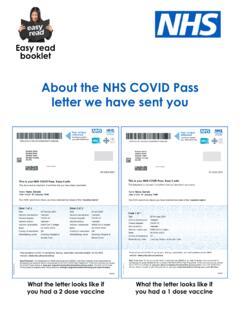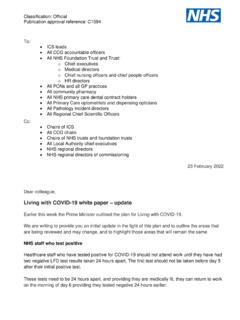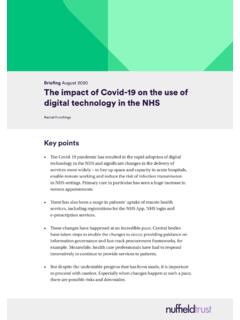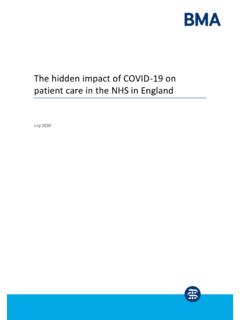Transcription of Post Covid-19 physiotherapy advice and exercise …
1 physiotherapy Department Northwick Park Hospital - 020 8869 2229/2232 Post Covid-19 physiotherapy advice and exercise programme As you recover from Covid-19 , the information in this leaflet about breathing techniques, general mobility and strengthening exercises will help to improve your day-to-day function. We recommend that you complete these exercises daily after you leave hospital. If your symptoms do not get better within six weeks, please speak to your GP about this and, if appropriate, please ask them to refer you to outpatient physiotherapy for further rehabilitation. 2 Post Covid-19 physiotherapy exercise programme Produced: May 2020 Review date: May 2022 Reference: 152020 Contents Page advice on common symptoms and self-care 3 Covid-19 rehabilitation Fatigue Sleep Appearance Family relationships Mood Returning to normal life The Active Cycle of Breathing Techniques (ACBT) 6 Breathing exercises to help clear your chest exercise Booklet 8 exercise programme to maintain strength and function exercise diary 12 Monitor your exercise compliance to keep you motivated 3 Post Covid-19 physiotherapy exercise programme Produced: May 2020 Review date: May 2022 Reference: 152020 advice on common symptoms and self-care Covid-19 rehabilitation Covid-19 is a new virus that has affected many people across the world, symptoms include.
2 A high temperature- this means you feel hot to touch on your chest or back A new, continuous cough- this means coughing a lot for more than an hour, or 3 or more coughing episodes in 24 hours Less of taste or smell At times people require admission into hospital for intensive care support to help with their breathing, this can cause some patients to experience muscle weakness, shortness of breath and fatigue. After you have been ill, especially for a long time, it is normal to take a while to feel like yourself again. How long this takes can vary from person to person. This booklet will address some of the common problems that people may experience and provide advice on how to deal with them. Fatigue Patients recovering from Covid-19 often experience a feeling of tiredness and exhaustion both physically and mentally caused by gentle exertion, this will improve in time. During your illness you will probably have lost some weight and muscle strength, and your joints may be stiff.
3 It is estimated that you will have lost 2% of your muscle mass each day during your illness. It is difficult to place a timescale on recovery as everyone recovers at a different rate, but you should not be concerned if it takes weeks or even months to get fully back to normal. The only way to recover and to get stronger is to walk and exercise little and often . It is important to pace your activities so you don t do everything in one go. Decide on the number of activities you need to do that day or even across the week, then make a plan to spread out the activities so you have adequate rest periods. Start with small goals and gradually increase the amount you can do as you feel able to do so. You may have been doing exercises on the ward with the physiotherapists, and this booklet will provide you with more exercises for you to complete at home independently. As your strength returns you may want to take more vigorous exercise such as swimming, fast walking or cycling.
4 If you want more specific advice before returning to other sports and activities, please speak to your GP. Sleep Whilst in hospital your usual sleep routine may have been disrupted by the busy environment, side effects of medications and care delivered to you night and day.. It is not uncommon for people to experience dreams related to their hospital stay which can seem very real and frightening. Problems with sleeping after you have left hospital are common and do get better with time. If these become particularly bothersome, please speak to your GP. 4 Post Covid-19 physiotherapy exercise programme Produced: May 2020 Review date: May 2022 Reference: 152020 You may find that you become tired very easily and that you need to take naps in the day and go to bed early, you should follow your body s needs. Sleeping too much during the day can mean that you are not tired at night. You should find that as your activity levels increase, your sleep pattern returns to normal.
5 The most important thing to remember is not to become worried about lack of sleep as this can make the problem worse. Try some relaxation techniques like mindfulness, meditation or even relaxing activities like listening to gentle music or reading a book before bed. It is best to avoid blue light from TV, phone and computer screens before bed as this can keep the brain alert. Appearance You may have noticed changes in your appearance such as hair loss or a change in the condition of your skin. If you have lost weight and muscle mass this can also affect your appearance. As your condition improves with diet, exercise , sleep and self-care, these problems should get better. If you have any scars or wounds from treatments you may have received, these will fade with time and become less obvious. If these scars continue to bother you, please speak to your GP. Family relationships You may find family and friends react slightly differently to you and you might feel they are overprotective towards you.
6 They will have been through a very anxious and stressful time, from which they will also need to recover. It can be helpful to talk about these feelings with each other to help you and your family come to terms with your period of illness. Mood Patients following a long stay in hospital may develop anxiety, low mood, depression, post-traumatic stress these are normal reactions to being critically ill. It is important to accept that it will take time to recover physically and psychologically. It can be useful to set small realistic goals to help you see your progress and feel better in yourself. You may find keeping a diary helps with this process and remember to be patient with yourself and your recovery, as it make take some time. It is important to speak with those you are close to but if the feelings continue, please speak to your GP who will advise you on different forms of treatment. You can also refer yourself for psychological support through Improving access to psychological therapies(IAPT): Brent talking therapies 020 8206 3924 Harrow talking therapies 020 8515 5015 5 Post Covid-19 physiotherapy exercise programme Produced: May 2020 Review date: May 2022 Reference: 152020 Sexual health Many people worry about when it is safe to resume sexual activities.
7 This should be gradual and will depend on how you are feeling. Returning to work It may take some time before you are well enough to return to work. Your GP will continue to care for you once you are at home, and will be able to advise you when you may be ready to return. If your employer has an occupational health department then it can be helpful to speak to them as they may have a return to work scheme. 6 Post Covid-19 physiotherapy exercise programme Produced: May 2020 Review date: May 2022 Reference: 152020 The Active Cycle of Breathing Techniques (ACBT) People with a lung problems often cough and produce more phlegm (sputum) than is usual. It is important to remove sputum from your lungs to help you breathe more easily, prevent chest infections and reduce bouts of coughing. Leaving sputum in your chest can make your condition worse. The Active Cycle of Breathing Techniques (ACBT) is one way to help you to clear your sputum from your chest.
8 ACBT is a set of breathing exercises that loosens and moves the sputum from your airways. It is best to be taught ACBT by a physiotherapist. The ACBT exercises are breathing control, deep breathing and huffing which are performed in a cycle until your chest feels clear. Breathing control Breathing control is breathing gently, using as little effort as possible. Breathe in and out gently through your nose if you can. If you cannot, breathe through your mouth instead If you breathe out through your mouth, purse your lips like you are blowing out a candle Try to let go of any tension in your body with each breath out Gradually try to make the breaths slower Try closing your eyes to help you to focus on your breathing and to relax It is very important to do breathing control in between the more active exercises of ACBT as it allows your airway to relax. Breathing control can also help you when you are short of breath or feeling fearful, anxious or in a panic.
9 Deep breathing exercises Take a long, slow, deep breath in, through your nose if you can. Try to keep your chest and shoulders relaxed. Breathe out gently and relaxed, like a sigh. You should do three-five deep breaths. Ask your physiotherapist to help you choose the right number of deep breaths for you. Some people find it helpful to hold their breath for about two-three seconds at the end of the breath in, before breathing out. Try the deep breathing exercises both with and without holding your breath and see which works best for you. Huffing A huff is exhaling through an open mouth and throat instead of coughing. It helps move sputum up your airways so that you can clear it in a controlled way. To huff you squeeze air quickly from your lungs, out through your open mouth and throat, as if you were trying to mist up a mirror or your glasses. Use your tummy muscles to help you squeeze the air out, but do not force it so much that you cause wheezing or tightness in your chest.
10 Huffing should always be followed by breathing control. There are two types of huff, which help to move sputum from different parts of the lungs. The small-long huff This will move sputum from low down in your chest. Take a small to medium breath in and then huff (squeeze) the air out until your lungs feel quite empty, as detailed above 7 Post Covid-19 physiotherapy exercise programme Produced: May 2020 Review date: May 2022 Reference: 152020 The big-short huff This moves sputum from higher up in your chest, so use this huff when it feels ready to come out, but not before. Take a deep breath in and then huff the air out quickly. This should clear your sputum without coughing. How do I know I am huffing correctly? Your huff should move the sputum in your chest by making it rumble or rattle . This will mean you are moving the sputum up the airways, and it should then clear easily.







